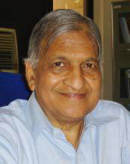
Ms. Shalini Dewan
Ms. Shalini Dewan, Director UN Information Centre, India put forth the view that UN is built on the premise of peace. If we have to have peace, we must work to twist the barrel of every gun and armament that we possess. This is the dream of a perfect world.
Unfortunately in the real world, the situation is far from perfect. Insecurity, war, conflict, terrorism are all a reality for the international community and the countries spend enormous funds arming themselves so that they can protect their people in times of need.
Yet, we all need to pause and pose some questions. Can the world exist without violence? Ms. Dewan answered that peace is possible and violence is certainly avoidable.
The UN vehemently opposes the inevitability of the rule of imposition, force, violence which has characterized relationships between individuals, groups, communities, people and nations since the dawn of times. India has contributed greatly to the world dialogue on non-violence and peace. India was in fact the Karambhoomi, or the laboratory of sublime ideas and pious actions. It has created a political philosophy of Panchsheel, the five principles of peaceful co-existence.
UN focuses on a culture of peace. It defines a culture of peace as a set of values, attitudes, traditions, modes based on respect for life, ending of violence, promotion and practice of non-violence through education, dialogue and co-operation, full support for promotion of all human rights, commitment to peaceful settlement of conflicts, respect for and promotion of the right to development, respect for and promotion of equal rights and opportunities for men and women, respect for promotion of the rights of everyone, to the freedom of expression, opinion and information, and adherence to the principles of freedom, justice and democracy, tolerance, solidarity, cooperation, cultural diversity, dialogue and understanding, at all levels of society and among nations.
In the course of past several decades, the international instruments, declarations drawn up in the world conferences under the auspices of UN testify the existence of norms, values and commitments, the objective of all of which is to support a culture of peace and constitute the basis of a universal, ethical frame of reference. Each member state of UN of whatever size, can contribute to the promotion of a culture of peace, the main role being to address the causes of conflicts so that they don't erupt into violence. Several specific measures of the national, regional and international levels need to be strengthened. A culture of peace is incumbent and a series of measures dealing with the promotion of international peace and security need to be devised. They include promoting general and complete disarmament, under strict and effective international control. If all the limited resources of a nation are channeled into war and arming itself, its development suffers. US President underlined the essence of this dilemma when he said
“ Every gun that is made, every warship that is launched, every rocket that is fired, signifies in its final form a theft from those who are hungry and are not fed, those who are not clothed.”
According to a figure released by the Stockholm International Peace research Institute, the world military expenditure in 2004 was estimated at $975 bn to build in and replenish military arsenals, thus valuable resources are being diverted from investing in human capital. According to the UN, the MDGs to which the world community agreed upon at the Millennium Summit of 2000 have a long way to go if they are to be on target because the planned date of 25th June is being shifted away on account of war and militarization. The costs of such decisions are easy to realize in terms of human misery, underdevelopment and lack of infrastructural facilities, increasing hunger, poverty and so on.
Finally, in the dawn of the 21st Century, all the countries agreed to write a new page of history. Peace is always possible, it can always prevail- but it has to be aspired for, encouraged, nurtured and cultivated on a daily basis. Without peace there is no development, no justice, and no democracy. To go from a culture of war and violence, to a culture of peace and dialogue, we have to change the values, attitudes, and behaviour of the past. Instead of the cynical proverb, ‘if you want peace, prepare for war', you must say ‘ if you want peace, prepare for peace' and try to build it in your daily life. Dr. Ashok Bapna
Dr. Ashok Bapna